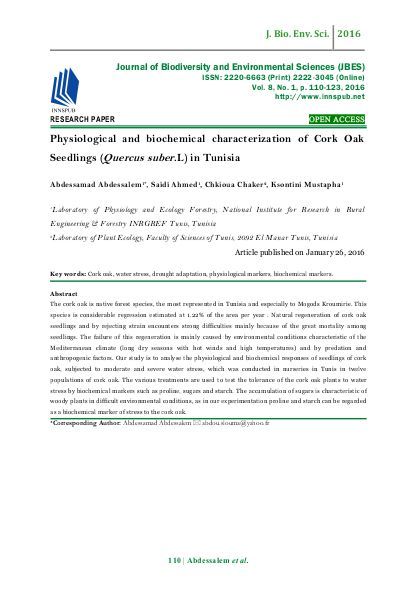By Abdessamad Abdessalem1*, Saidi Ahmed1, Chkioua Chaker2, Ksontini Mustapha1
- Laboratory of Physiology and Ecology Forestry, National Institute for Research in Rural
Engineering & Forestry INRGREF Tunis, Tunisia - Laboratory of Plant Ecology, Faculty of Sciences of Tunis, 2092 El Manar Tunis, Tunisia
The cork oak is native forest species, the most represented in Tunisia
and especially to Mogods Kroumirie. This species is considerable
regression estimated at 1.22% of the area per year . Natural
regeneration of cork oak seedlings and by rejecting strain encounters
strong difficulties mainly because of the great mortality among
seedlings.
The failure of this regeneration is mainly caused by
environmental conditions characteristic of the Mediterranean climate
(long dry seasons with hot winds and high temperatures) and by predation
and anthropogenic factors. Our study is to analyse the physiological
and biochemical responses of seedlings of cork oak, subjected to
moderate and severe water stress, which was conducted in nurseries in
Tunis in twelve populations of cork oak. The various treatments are used
to test the tolerance of the cork oak plants to water stress by
biochemical markers such as proline, sugars and starch. The accumulation
of sugars is characteristic of woody plants in difficult environmental
conditions, as in our experimentation proline and starch can be regarded
as a biochemical marker of stress to the cork oak. Source: http://bit.ly/2abcnp2More Articles of JBES: Iranian Pimpinella L. (Apiaceae): A taxonomic revision – JBES An open access research journals















